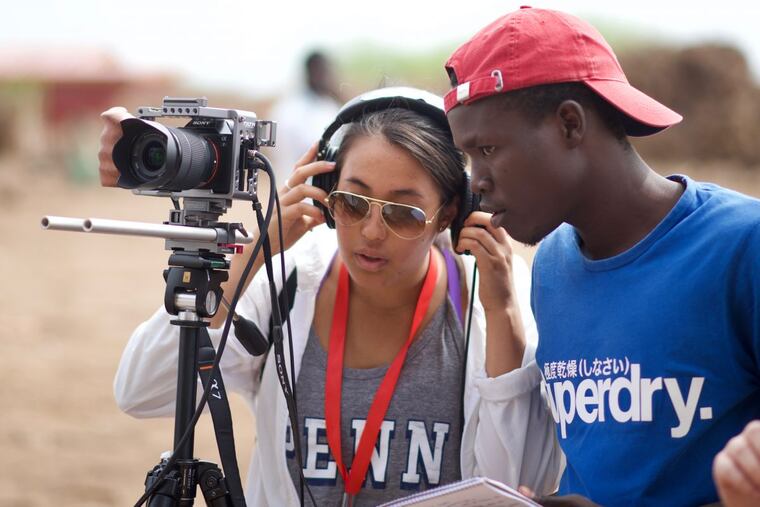In Kenya, Penn students experience refugee camp life
Last week, a group returned from Penn in Kenya, a two-week program in which they visited a refugee camp to film short documentaries.

Jennifer Chen, 18, from California, was watching a group of children playing in the mud at Kenya's Kalobeyei refugee camp. Or so the University of Pennsylvania sophomore thought, until she and some of her fellow students looked more closely.
"They were using mud to make houses on the ground, and they're, like, beautiful structures with … skyscraper-like buildings," she said. "Some of them were making places that they used to live, and some of them were making things that they imagined. It's like a therapy for the kids."
"It was just incredible to see them doing things with their hands and being so creative," Chen added.
The students were participating in Penn in Kenya, a new summer study-abroad program, supported by the College of Arts and Sciences' Making a Difference in Diverse Communities grant. The grant is also funding research and exchange programs in Guatemala, Ecuador, India, and Philadelphia.
During the two-week program, eight Penn students, two teaching assistants, and Penn professor Peter Decherney traveled to Kakuma and Kalobeyei to make a series of short documentaries on life in the U.N. refugee camps. The videos, which are aimed at combating negative stereotypes about refugees and refugee camps, are to be part of kits for new arrivals to Kalobeyei and cover topics including food and water distribution, health and education in the camps, and protection measures.
"We really went to so many different places, and explored so many different aspects of the camp," said Sonari Chidi, also 18, a sophomore from California. "It was really great to be able to have that immersive kind of experience and be able to learn more about what the camp is."
Kakuma and Kalobeyei are home to more than 180,000 refugees, most under 18 and most from South Sudan and Somalia. Kakuma opened in 1992 and Kalobeyei opened last year to house an overflow of refugees from other camps in Kenya.
The first week of Penn in Kenya was a pre-departure program teaching students about the refugee camps and how to use the camera equipment. They then left for Kenya, where students spent two days teaching workshops in the camps and spent the rest of their time developing their documentaries. Students receive course credit for their participation.
The program was a partnership with FilmAid, a nonprofit that trains young refugees in filmmaking and other media skills, encourages refugees to make movies, and does community outreach through video. Penn students worked with graduates of FilmAid's media skills program to make their videos, and the final documentaries are part of FilmAid's community outreach efforts.
Decherney began developing the program after meeting FilmAid's founder, Caroline Baron, and executive director, Keefe Mureen, at the State Department's Making Media That Matters event last year. He was excited about creating connections between students and refugees, and introducing virtual reality filming to FilmAid's work.
"When you see an image, when you watch a film, there's someone's perspective. … With virtual reality, you can let someone else experience a space in a way that they're less guided by the filmmaker's perspective," he said.
Although Decherney and his students returned from Kenya last Thursday, the end of Penn in Kenya doesn't mark the end of their involvement with FilmAid, Kakuma, and Kalobeyei. Penn in Kenya students are already trying to find ways to continue to support the refugee camps from campus, and Penn's cinema and media studies department sends an intern to FilmAid each year.
Decherney plans to exhibit the finished documentaries on campus in October.